Networks and Cyber Security BSc (Hons) at Northumbria University has been created to meet global demand for skilled individuals who understand how networks are designed, built and configured, how Cybersecurity works in an age where the online world is so vulnerable to attacks, and how software is used to monitor and secure these systems.
As we increasingly move our lives online, there is high demand for network and cyber security skills. So, this may be a future-proof career choice for people ready to rise to the challenge.














